Key takeaways:
- Learning from failures is essential for improving outcomes and refining approaches, highlighting the need for community engagement and adaptability.
- Common reasons for research failures include lack of clear objectives, inadequate stakeholder engagement, and poor data management.
- Implementing a structured planning process and maintaining ongoing communication can mitigate research failures and foster collaboration.
- Reflecting on past setbacks provides valuable insights for future research methodologies, emphasizing the importance of specificity and genuine community feedback.
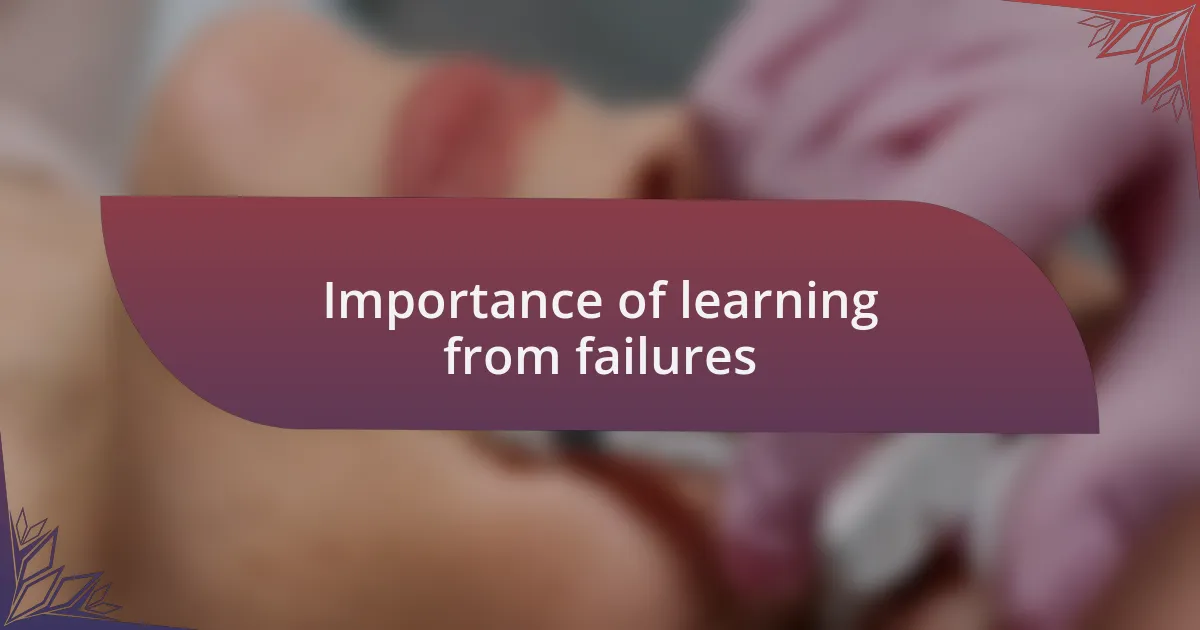
Importance of learning from failures
Learning from failures is crucial because it allows us to refine our approaches and improve our outcomes. I remember a project where we aimed to increase vaccination rates in a vulnerable community. Despite our best efforts, the campaign flopped. Initially, I felt disheartened, but upon reflection, I realized we hadn’t engaged with the community effectively. This failure illuminated the importance of listening to the very people we aimed to help.
Every setback brings with it a unique lesson; the key is being open to those lessons. For instance, after a research proposal of mine was rejected, I felt a wave of frustration. I had put so much work into it! However, digging into the reviewers’ comments revealed gaps in my methodology that I had overlooked. This moment taught me that criticism, while painful, can lead to significant growth.
Is it possible that we fear failure too much? I often wonder. Embracing failure helps shift our perspective from seeing it as a negative to viewing it as a stepping stone. Each failure can serve as a catalyst for innovation, pushing us to think creatively and find new solutions. What if we viewed failures not as final destinations but as part of a larger journey toward success?
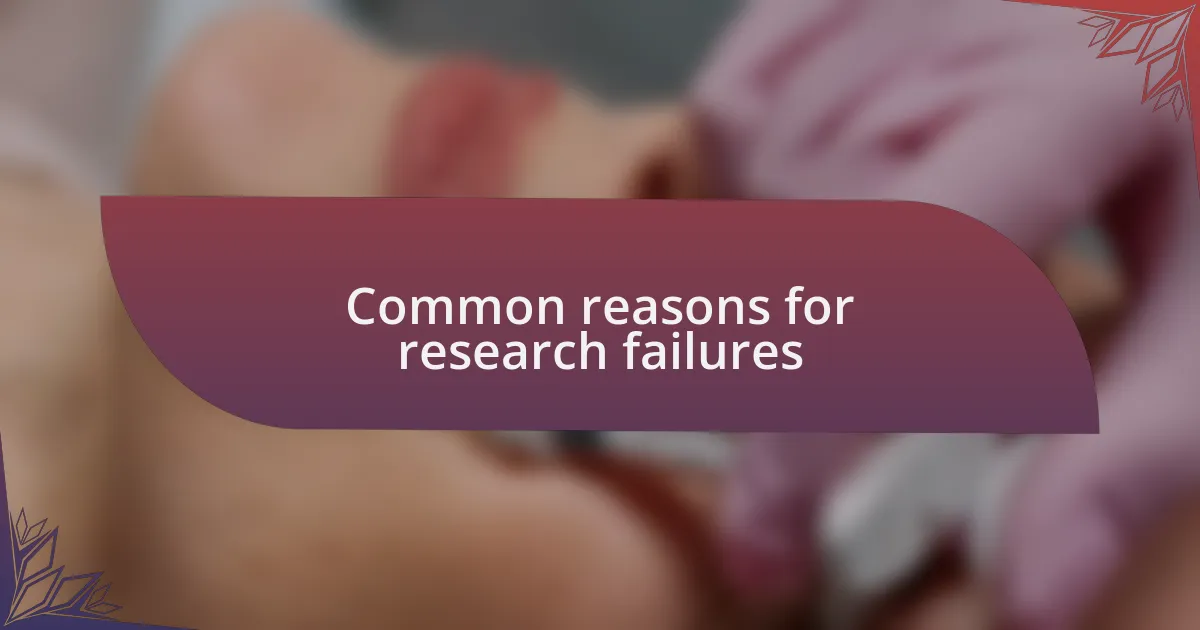
Common reasons for research failures
One of the most common reasons for research failures lies in a lack of clear objectives. Early in my career, I remember working on a public health initiative where we had a broad goal of improving health literacy. However, without specific, measurable targets, our efforts became scattered and unfocused. This experience taught me that clarity in purpose is vital; without it, even the best intentions can lead to inefficiency.
Another frequent pitfall I’ve encountered is inadequate stakeholder engagement. In one project aimed at reducing obesity rates, I overlooked the importance of collaborating with local community leaders. As a result, our proposed interventions didn’t resonate with the very people we intended to help. It made me realize that genuine engagement and understanding the community’s needs are not just beneficial; they are essential for success.
Finally, poor data management can derail even the most promising research. I vividly remember a study where I was so excited to collect data that I neglected proper organization. The end result was a jumble of information that was impossible to analyze effectively. This taught me the hard way that careful planning and management of data are just as critical as the research questions we aim to answer. Have you ever experienced something similar, only to understand later that diligence in every phase is what leads to genuine success?
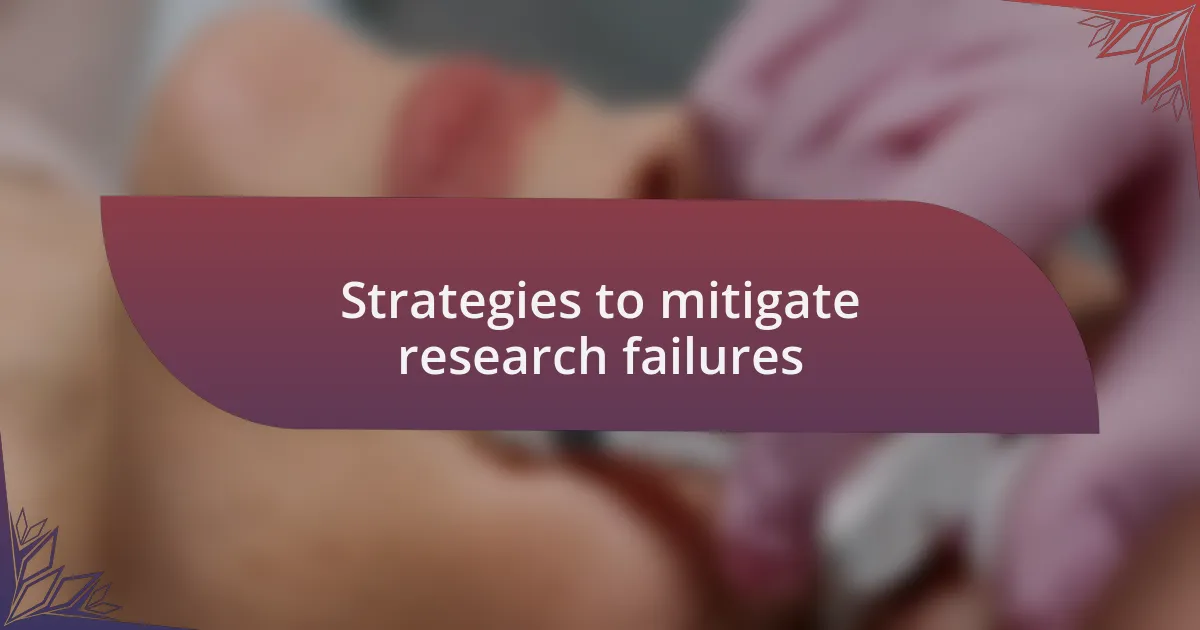
Strategies to mitigate research failures
One effective strategy to mitigate research failures is to implement a structured planning process from the outset. In one of my earlier projects, I learned the hard way that diving into data collection without a thorough plan can lead to chaos. I once spent weeks gathering information only to realize my questions were misaligned with my objectives. That moment of clarity taught me the importance of mapping out objectives, methodologies, and timelines before getting started.
Another key approach is to prioritize ongoing communication with stakeholders throughout the research journey. I remember a project where I established regular check-ins with community representatives. This openness not only strengthened our relationship but also ensured that our interventions were tailored to their evolving needs. Have you ever found how simple conversations can reveal insights that dramatically reshape your approach? It’s a reminder that collaboration fosters adaptability and relevance.
Lastly, embracing flexibility throughout the research process can be invaluable. In one study, I was committed to a specific methodology that, in hindsight, wasn’t yielding the expected results. Instead of sticking to it, I pivoted based on interim findings which ultimately led to breakthroughs I hadn’t anticipated. I learned that research should be a living process, one that welcomes change and evolution based on what unfolds. How often do we cling to a plan out of pride when a course correction could be the key to success?
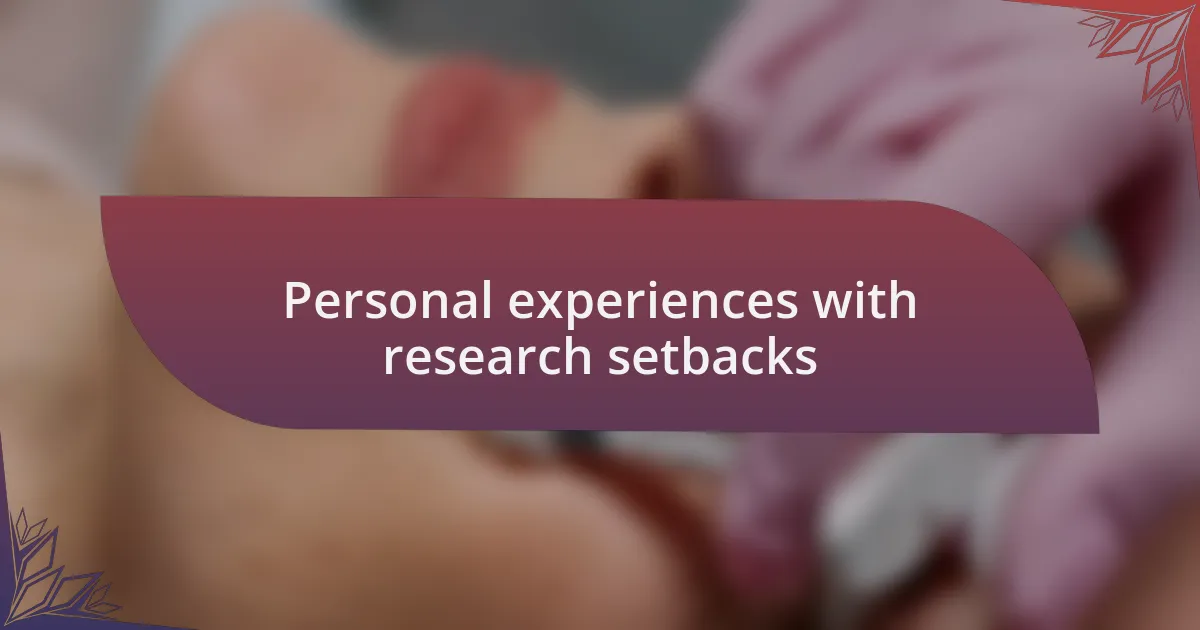
Personal experiences with research setbacks
In my early days of research, I encountered a significant setback that still resonates with me today. I was working on a public health project focused on vaccination rates, convinced that I had all the necessary data. However, upon analyzing the results, I discovered that a crucial demographic was overlooked. The disappointment I felt taught me the importance of conducting a thorough needs assessment before data collection. Have you ever experienced a moment that completely shifted your perspective on a project?
Another setback came when I assumed all stakeholders were on the same page regarding our research goals. I recall a community forum where I shared preliminary results, only to be met with confusion and pushback. It hit me then that I had failed to adequately involve them in the process from the start. This not only affected our findings but also strained relationships. I learned that ensuring everyone understands their role and the research purpose is vital to foster collaboration and trust.
Lastly, there was a time when I became overly attached to a specific outcome I wanted to achieve. I had invested countless hours into a project, hoping for a particular correlation between health interventions and community outcomes. When the data revealed no significant relationship, I felt defeated. Yet, it was through that disappointment that I realized the true value of the unexpected results. They demanded a fresh inquiry into how we understand health behaviors. Isn’t it fascinating how sometimes our failures can lead to new, uncharted territories?
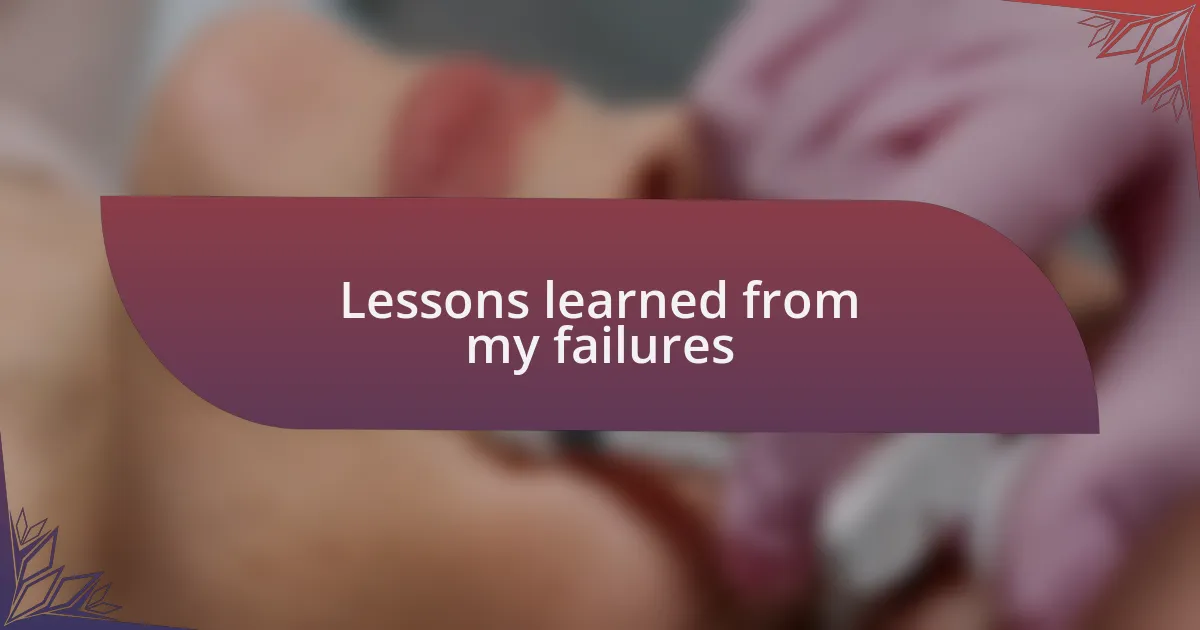
Lessons learned from my failures
Missteps can carve deeper lessons than victories ever will. I remember another project where I didn’t account for external factors affecting the health outcomes we observed. It felt frustrating at the time, especially when my carefully constructed analyses fell apart. Reflecting on it, I learned that external variables are often just as significant as our main focus, and neglecting them can lead to skewed conclusions. Have you ever had to adjust your perspective because of unexpected variables?
One instance that stands out is when I approached a community workshop with enthusiasm but minimal preparation. My intention was to foster discussion, but instead, the participants looked bewildered, and I soon realized I hadn’t provided adequate context for our research. It was a humbling moment, as I had to wrestle with my ego. That experience highlighted the need for clear communication; it’s essential to set the stage properly to invite meaningful dialogue. How prepared do you feel when engaging with participants in your studies?
Each failure has a transformative power if we’re willing to confront it. During a project emphasizing mental health stigma, I had chosen a methodology based on convenience, deeply regretting it when the data didn’t reflect the community’s true sentiments. This frustration pushed me to seek more qualitative approaches in the future, allowing for richer narratives. Isn’t it remarkable how our missteps often illuminate the path toward better practices?
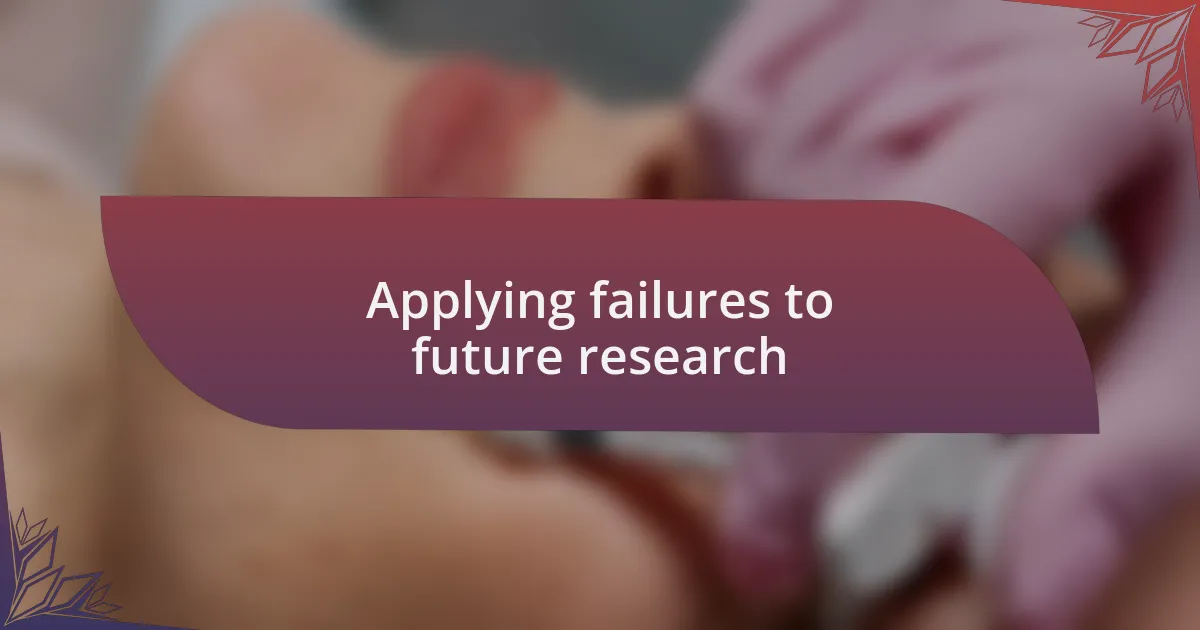
Applying failures to future research
When reflecting on past failures, I realized that they often guide my choice of methods in future projects. For instance, after an analysis turned up inconclusive results due to sampling issues, I adapted by incorporating a more robust selection process in subsequent studies. It made me ponder: how often do we reassess our methodologies to ensure they serve our research objectives effectively?
I vividly remember collapsing under the weight of an overly ambitious research plan when I attempted to address multiple health issues in one study. The resulting chaos not only diluted my focus but also hindered my ability to draw clear, actionable insights. This taught me the importance of specificity; nothing is more effective than honed focus. Have you ever found that narrowing your scope led to greater impact in your projects?
Building on my experiences has become a crucial part of my research journey. When I faced significant pushback from the community regarding a health initiative, I took that feedback seriously. It underscored the need for genuine engagement and flexibility in my approach. How do you integrate community feedback into your future plans, learning from both successes and setbacks?